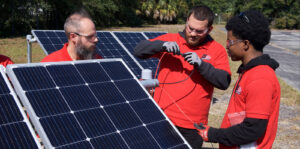Duration:
7 months
Campus Availability:
- Tulsa, OK
- Jacksonville, FL
- Houston, TX
- Dallas Metro (Irving), TX
Upcoming Start Dates:
Jul. 11, 2025 & Aug. 8, 2025
START TRAINING AS AN ELECTRIC TECHNICIAN TODAY
Get started in a career that powers up and illuminates the world!
Electrical Technologies teaches the fundamentals of solar, wire, motor, lighting, and distribution technologies. This program is best suited to prepare students for entry-level job opportunities as an equipment electrician.
Hands-on Electrician Training That Prepares You for an Ever-Evolving Industry
At Tulsa Welding School (TWS), you can get hands-on electrician training in as little as 7 months. Get trained in a variety of skills needed to maintain and service residential, commercial, and industrial electrical equipment.
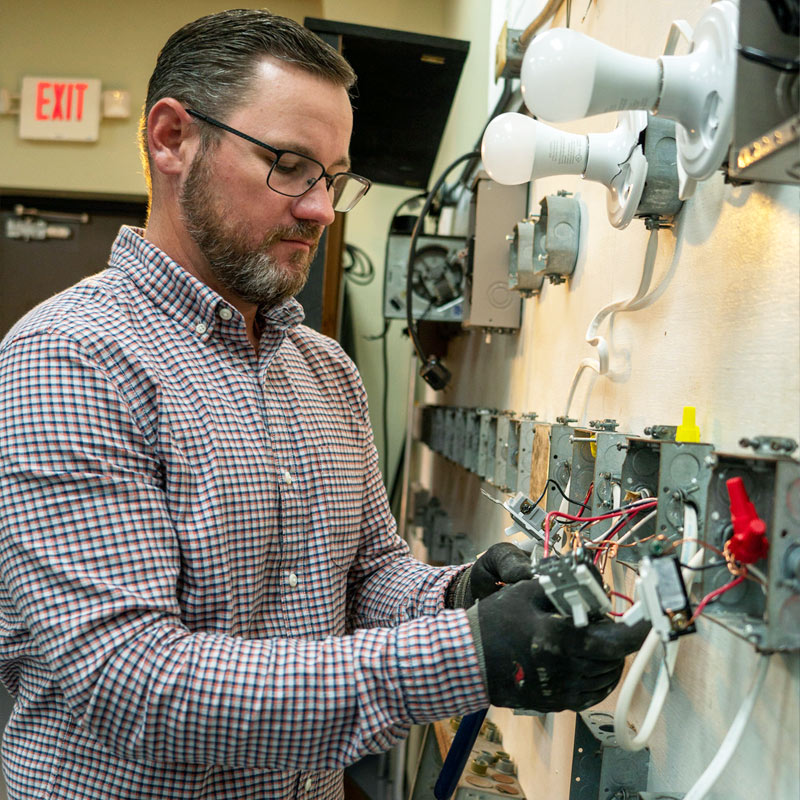
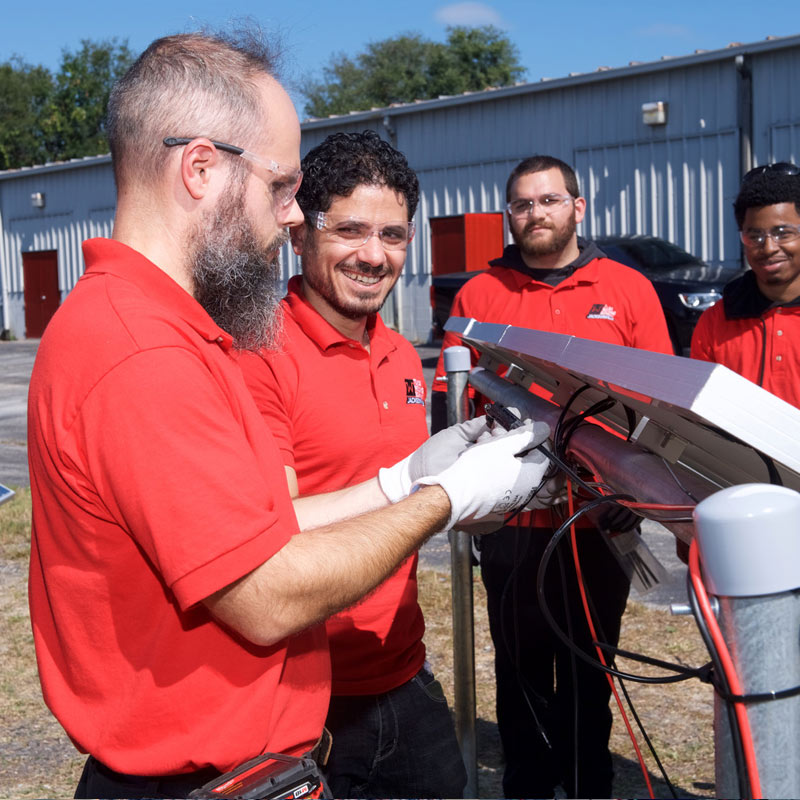
The Electrical Technologies program consists of courses that will prepare you for important concepts like:
- The basic understanding of electricity
- Photovoltaic systems (solar)
- Residential wiring
- Commercial wiring
- Motor and lighting devices
- Understanding the National Electrical Code (NEC) book
Employment is Expected to Grow for Electricians in the US by 80,200 Jobs by 2033!i
Flexible Class Schedules
Morning, Afternoon and Evening Classes Available
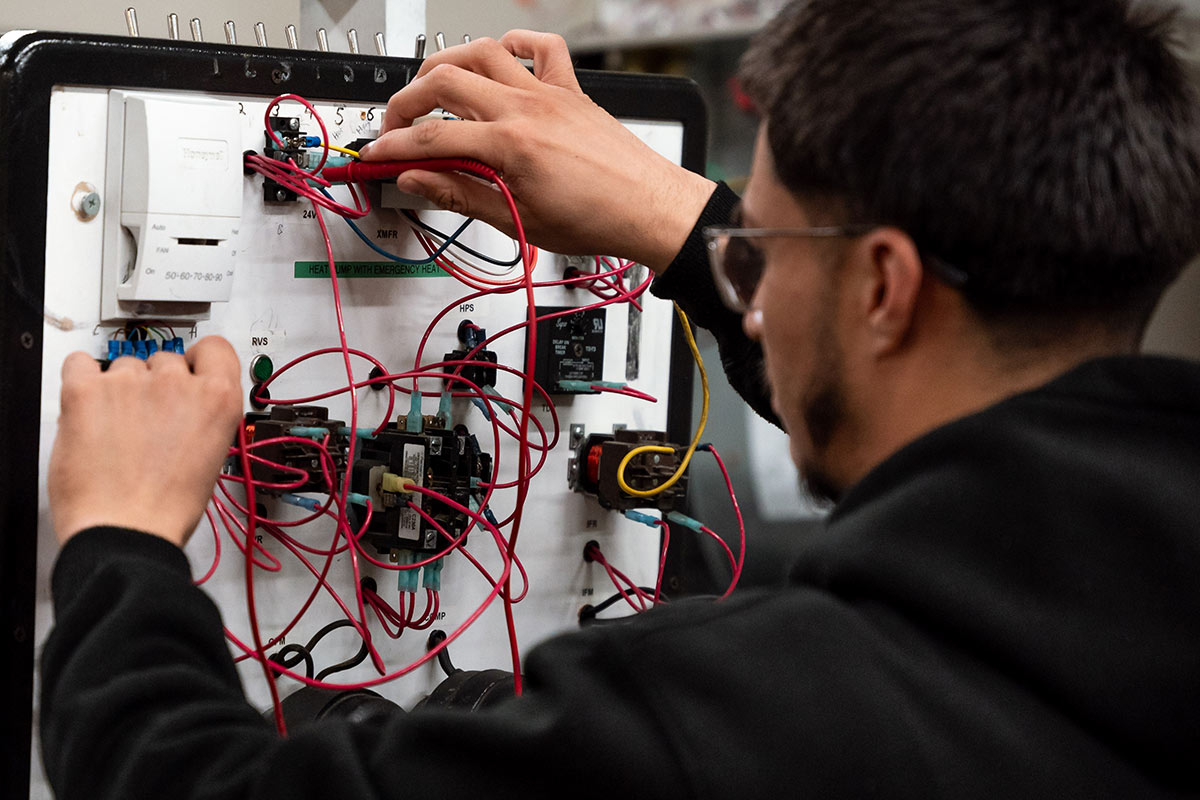
TWS offers flexible schedules whether you are just graduating from high school, changing your career, or transitioning from military to civilian life. Class schedules range from morning, afternoon and evening, depending on the program and campus location.
We work hard to find the right program and the right schedule to help you succeed. Contact us for more information on upcoming class times and start dates for the Electrical Technologies program.
Electrical Technologies Class Start Dates
Class Schedules (Mon - Fri)
- Morning 7:00am-12:15pm
- Afternoon 1:00pm-6:00pm
- Evening 6:30pm-11:45pm
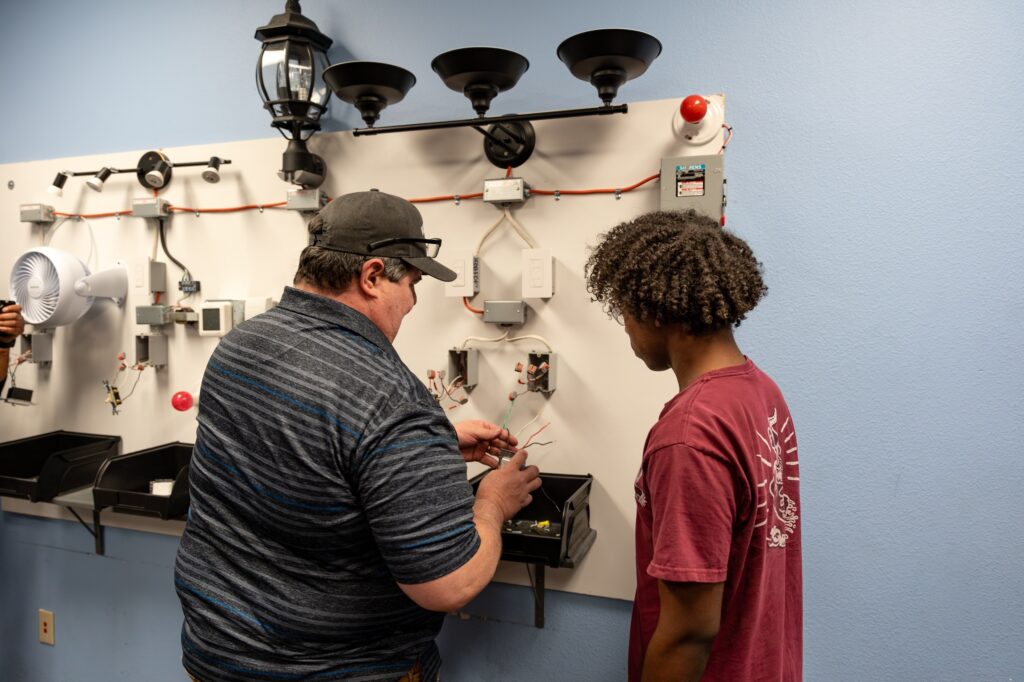
HYBRID INSTRUCTION
At TWS, we know you’re here to build real-world skills, not spend endless hours in a classroom. That’s why we offer a flexible online hybrid model, allowing you to complete the theoretical parts of your program online, as long as it’s done by the deadline. When you’re on campus, your time is spent where it counts: hands-on in the lab with tools, equipment, and expert instructors.
This approach gives you the freedom to balance school with other responsibilities, while still getting the hands-on training you need for a successful career in the skilled trades.

Experiences & Opportunities
Resources for TWS Students
Virtual Tour
Take a virtual tour of our campuses! Explore the classrooms, labs and shop floor with our unique interactive experience.
Employer Relationships
TWS has relationships with major employers across the United States. Our dedicated Career Services team will be there to support you every step of the way after graduation.
The Right Tools for the Job
When you begin your education at TWS, we provide you with an extensive gear package. You get the high quality professional tools you need to succeed. Ask your Admissions Representative for more information about the gear package for your program.
Scholarship Opportunities
Learn more about what scholarship opportunities are available and how you might qualify for one. Start the process of applying for a scholarship today!

Ready to Move Forward?
All it takes to move forward is making that first step. Whether you need more information, schedule a tour or want to speak to someone, we’re with you every step of the way.
Are YOU ready to change your life?
Listen to these TWS graduates who changed theirs.
We all come from different walks of life, and different circumstances, but it’s the hard work we do and the blood sweat and tears put in to make us who we are today.
Tulsa Welding School gave these graduates the structure, confidence, and guidance they needed to make a difference in their lives. It only takes one decision to start the journey on a path towards a better career. A better Life.
Hear the stories of these TWS graduates and how they changed their lives:
Jonathan Garza
Coming from a place of darkness and addiction, Jonathan made the change he needed to get his life back on track for his family, career, and his stability. Professional Welding Graduate from our Houston campus - Hear his story on how TWS changed his life.
David Mclean
With so many options in front of him and no clear path ahead, David chose to invest in his life and make the decision to enroll at a trade school. TWS gave him the opportunities to be the best version of himself he could be. Professional Welding Graduate from our Jacksonville campus - Hear his story on how TWS changed his life
Cody Hudgens
Not basing his chances on luck, Cody took the opportunity of becoming a welder in his own hands after serving in the United States Marine Corps. TWS gave him the knowledge and skills he needed to take his passion to the next level. Professional Welding Graduate from our Tulsa campus - Hear his story on how TWS changed his life
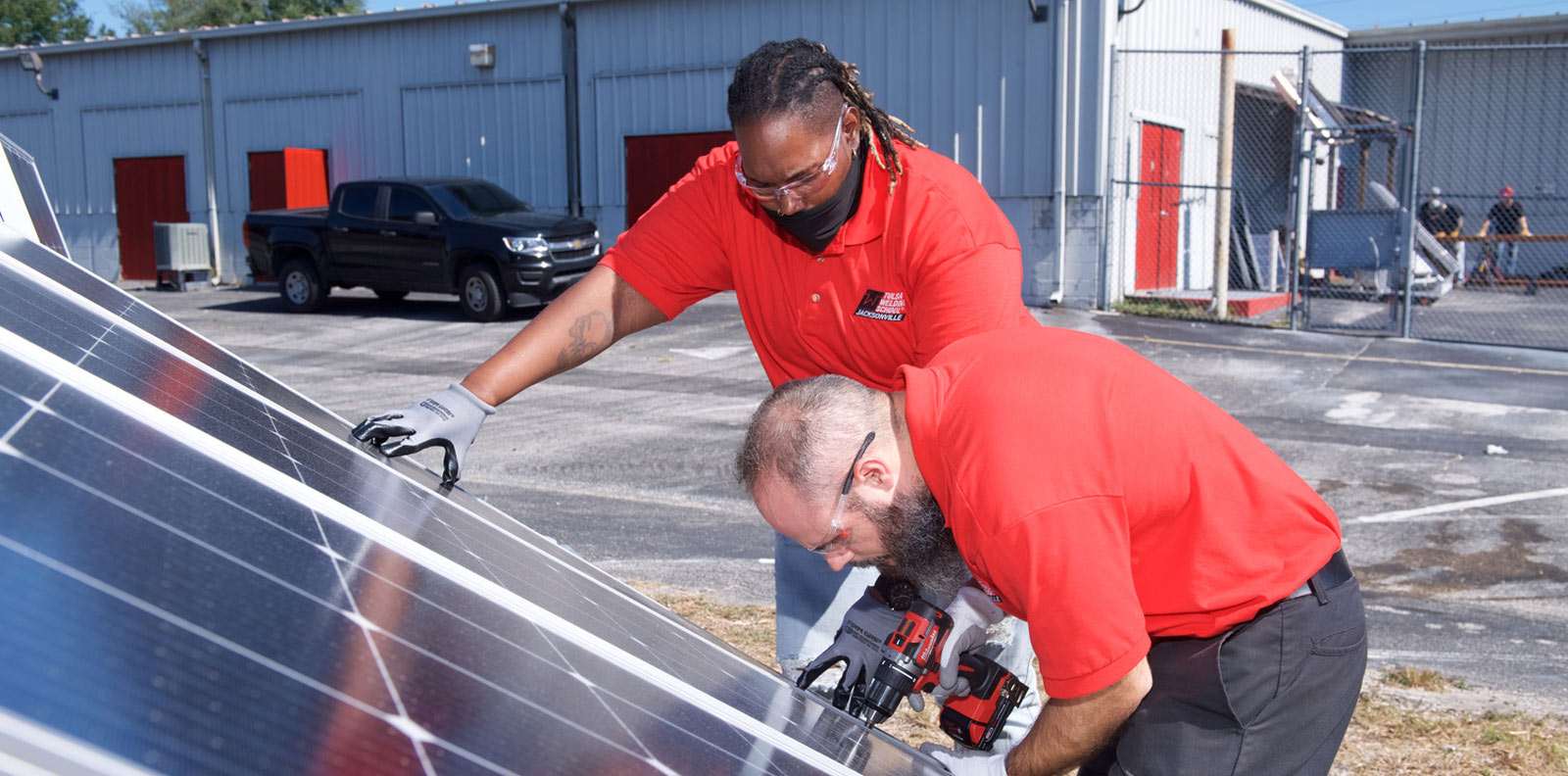
Program Courses for Electrical Technologies
Fundamentals of Electricity
HVE100
This course provides students with a basic understanding of electricity. Instructors will teach schematic wiring, test meter usage and safety processes for handling electrical systems. Students will work with dual voltage systems commonly found in HVAC/R equipment and learn about control circuit wiring and high voltage wiring.
Requirements
- 4 Semester Credit Hours
- 90 Lecture Hours
- 10 Lab Hours
- 100 Total Contact Hours
- 14.5 Outside Prep Hours
Fundamentals of Solar
HVE110
This module provides an overview of photovoltaic (PV) science and an introduction to the fundamentals of solar energy.
Through a combination of lecture, problem-solving and hands-on lab exercises, students will learn the concepts and processes of photovoltaic systems, including their design and installation.
The module covers the scope of solar energy systems’ conceptual, mechanical and electrical design, with an emphasis on wiring and electrical issues.
Requirements
- 4 Semester Credit Hours
- 50 Lecture Hours
- 50 Lab Hours
- 100 Total Contact Hours
- 10 Outside Prep Hours
Electrical Wiring – Residential
HVE120
This course introduces the most current version of the National Electrical Code Book to the students as a guide throughout the class.
The primary goal of the program is to teach basic techniques of Residential wiring from the standpoint of interpreting all code book requirements.
Students will put into practice all that they have learned by wiring a scaled down three bedroom home. A study of electrical safety is provided to ensure a complete understanding of hand tools, ladders, shock hazards, and the personal protective equipment required to work in this field. They will be required to safely place all wiring, circuits, switches, receptacles, lighting fixtures, and GFCI devices in the trainer according to the electrical code.
Requirements
- Prerequisite Course(s): HVE100
- 4 Semester Credit Hours
- 50 Lecture Hours
- 50 Lab Hours
- 100 Total Contact Hours
- 15 Outside Prep Hours
Electrical Wiring – Commercial
HVE130
The Commercial wiring course follows through with concepts learned in the Residential wiring course of training, delving deeper into the National Electrical Code book.
Students will be tasked with code book interpretation through the study of load calculations, blueprint reading, cost estimating, three-phase motor wiring, and conduit manipulation.
Students will wire commercial lighting and three-phase motors as they research the required applications. A mock commercial building will be wired by students in accordance with applicable code, using conduit to protect their wiring.
Requirements
- Prerequisite Course(s): HVE100
- 4 Semester Credit Hours
- 50 Lecture Hours
- 50 Lab Hours
- 100 Total Contact Hours
- 20 Outside Prep Hours
Emerging Electrical Applications
HVE145
This class begins with an overview of Emerging Electrical Applications and the class introduces characteristics of Low Voltage, usage of Audio/Video wiring and the install/use of Security Cameras.
In addition, this course will review the importance of Audio/Video over IP, characteristics and key elements of Home Automation and features of Home Entertainment Systems.
Students will be exposed to Residential/Commercial Control Systems & Programming, as well as an overview of IP Control Systems
Requirements
- Prerequisite Course(s): HVE100
- 4 Semester Credit Hours
- 50 Lecture Hours
- 50 Lab Hours
- 100 Total Contact Hours
- 15 Outside Prep Hours
Motors, Lighting & PLC
HVE155
This class elaborates on the characteristics of Alternating Current, explaining the behavior of electricity and how it functions in the application of motors, lighting, and the devices that control them. Students will learn the differences between DC and AC motors, single phase and three-phase applications, calculating the proper sizing of motors, and the selection of the motor controller as well as overload protection.
This class also covers the characteristics of light, the handling and installation of various types of lighting (incandescent, fluorescent, high intensity discharge, LED), and the controls used in their operation.
In addition, this class will cover the basic use and programming of a PLC (Programmable Logic Controller).
Requirements
- 4 Semester Credit Hours
- 50 Lecture Hours
- 50 Lab Hours
- 100 Total Contact Hours
- 15 Outside Prep Hours
Electrical Distribution Systems (ET)
HVE165
This class will describe the operating characteristics of various types of transformers. Using the National Electrical Code, students will calculate transformer sizes for various applications. This module describes the purpose of switchgear, its construction, and maintenance.
In this class, students will also understand the importance of overcurrent protection, describe the various types of fuses and circuit breakers in the industry, and select the proper size for specific applications, as well as conduit bending.
Students will also apply their knowledge of the proper methods for grounding and bonding according to the requirements of the NEC. This class describes the wiring methods for specific hazardous locations, and also introduces the installation of cable tray systems.
Requirements
- Prerequisite Course(s): HVE100
- 4 Semester Credit Hours
- 50 Lecture Hours
- 50 Lab Hours
- 100 Total Contact Hours
- 15 Outside Prep Hours
Student Reviews
Adonis Lenington
